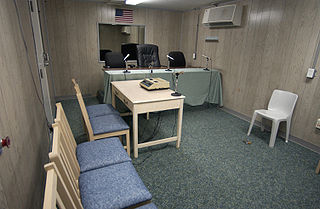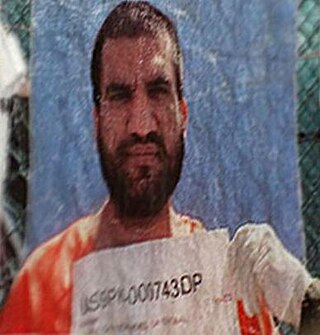Related Research Articles

The Combatant Status Review Tribunals (CSRT) were a set of tribunals for confirming whether detainees held by the United States at the Guantanamo Bay detention camp had been correctly designated as "enemy combatants". The CSRTs were established July 7, 2004 by order of U.S. Deputy Secretary of Defense Paul Wolfowitz after U.S. Supreme Court rulings in Hamdi v. Rumsfeld and Rasul v. Bush and were coordinated through the Office for the Administrative Review of the Detention of Enemy Combatants.
Extrajudicial prisoners of the United States, in the context of the early twenty-first century War on Terrorism, refers to foreign nationals the United States detains outside of the legal process required within United States legal jurisdiction. In this context, the U.S. government is maintaining torture centers, called black sites, operated by both known and secret intelligence agencies. Such black sites were later confirmed by reports from journalists, investigations, and from men who had been imprisoned and tortured there, and later released after being tortured until the CIA was comfortable they had done nothing wrong, and had nothing to hide.

Pul-e-Charkhi Prison, also known as the Afghan National Detention Facility, is a maximum security prison located next to the Ahmad Shah Baba Mina neighborhood in the eastern part of Kabul, Afghanistan. It has the capacity to house between 5,000 and 14,000 inmates, but as of February 2023 it only has between 2,000 and 2,500 inmates, most of whom have been arrested and convicted within the jurisdiction of Kabul Province. It is considered the country's largest prison.

Musab Omar Ali Al Mudwani is a citizen of Yemen who was held in extrajudicial detention in the United States Guantanamo Bay detainment camps, in Cuba.

Muhammad Saad Iqbal is a Pakistani citizen who was held in extrajudicial detention in the United States Guantanamo Bay detention camps, in Cuba. Madni's Guantanamo Internment Serial Number was 743. The Department of Defense reports that he was born on October 17, 1977.
Umar Abdullah Al Kunduzi is a citizen of Afghanistan, who was held in extrajudicial detention in the United States Guantanamo Bay detention camps, in Cuba.
Fethi Boucetta is a citizen of Algeria, who was held in extrajudicial detention in the United States Guantanamo Bay detention camps, in Cuba. His Guantanamo Internment Serial Number was 718. The Department of Defense reports that he was born on September 15, 1963, in Algiers.
Hajji Sahib Rohullah Wakil is a citizen of Afghanistan who was held in extrajudicial detention in the United States Guantanamo Bay detention camps, in Cuba. His Guantanamo Internment Serial Number was 798. American intelligence analysts estimate he was born in 1962, in Jalalabad, Afghanistan. He has since been transferred from Guantanamo Bay to the American wing of the Pol-e-Charkhi prison in Kabul, Afghanistan. On November 18, 2019 the U.S. Department of the Treasury designated him for supporting activities of the ISIS branch in Afghanistan.

Mohamed Jawad, was accused of attempted murder before a Guantanamo military commission on charges that he threw a grenade at a passing American convoy on December 17, 2002. Jawad's family says that he was 12 years old at the time of his detention in 2002. The United States Department of Defense maintains that a bone scan showed he was about 17 when taken into custody.
Swar Khan also known as Swatkhan Bahar is a citizen of Afghanistan, who was held in extrajudicial detention in the United States's Guantanamo Bay detention camps, in Cuba.
Dr. Hafizullah Shabaz Khail is a citizen of Afghanistan, who was held in the United States's Guantanamo Bay detention camps, in Cuba. American intelligence analysts estimate he was born in 1946, in Paktia, Afghanistan.
Adil Hadi al Jazairi Bin Hamlili is a citizen of Algeria who was held in extrajudicial detention in the United States Guantanamo Bay detainment camps, in Cuba. The US Department of Defense reports that Bin Hamlili was born on 26 June 1976, in Oram (Oran) [sic] Algeria. His Guantanamo Internment Serial Number was 1452.
Nasir Maziyad Abdallah Al Qurayshi Al Subii is a citizen of Saudi Arabia who was held in extrajudicial detention in the United States Guantanamo Bay detention camps, in Cuba. His Guantanamo Internment Serial Number was 497. American counter-terror analysts estimate he was born in 1983, in Al Arib, Saudi Arabia.
The Parwan Detention Facility is Afghanistan's main military prison. Situated next to the Bagram Air Base in the Parwan Province of Afghanistan, the prison was built by the U.S. during the George W. Bush administration. The Parwan Detention Facility, which housed foreign and local combatants, was maintained by the Afghan National Army.
Ameen Mohammad Albakri is held in extrajudicial detention in the United States Bagram Theater Internment Facility.
In United States law, habeas corpus is a recourse challenging the reasons or conditions of a person's detention under color of law. The Guantanamo Bay detention camp is a United States military prison located within Guantanamo Bay Naval Base. A persistent standard of indefinite detention without trial and incidents of torture led the operations of the Guantanamo Bay detention camp to be challenged internationally as an affront to international human rights, and challenged domestically as a violation of the Due Process Clause of the Fifth and Fourteenth amendments of the United States Constitution, including the right of petition for habeas corpus. In 19 February 2002, Guantanamo detainees petitioned in federal court for a writ of habeas corpus to review the legality of their detention.
Haji Rohullah is a citizen of Afghanistan held in the United States' Bagram Theater detention facility, in Afghanistan. Rohullah worked as a driver before being seized at his farm in Jalalabad in August 2006.

Tina Monshipour Foster is an Iranian-American lawyer and director of the International Justice Network.
El Mashad v. Bush is a writ of habeas corpus filed on behalf of several Guantanamo detainees, including Sherif el-Mashad, Adel Fattouh Aly Ahmed Algazzar and Alladeen.
Haji Wazir is a citizen of Afghanistan who was captured in Pakistan in 2002, and held since then in extrajudicial detention in the United States' Bagram Theater internment facility. He is notable because he is one of the very few detainees in Bagram who has had a writ of habeas corpus filed on his behalf.
References
- 1 2 3 4 5 Eric Lewis (August 16, 2007). "Custody Dispute: Why is the U.S. stashing detainees at Policharki prison in Afghanistan?". Slate magazine . Retrieved 2008-02-01.
Ruzatullah's young son tried to comfort his father, but according to other family members, Ruzatullah was angry and nonresponsive, showing the signs of long-term confinement and torture. He told his brother that he has lost hope that anyone will listen to his pleas.
- ↑ "IJN Wins Third Victory in U.S. Courts". International Justice Network. October 3, 2007. Retrieved 2008-02-01.[ permanent dead link ]
- ↑ Lyle Denniston (September 13, 2007). "Another detainee case put on hold". Scotusblog. Archived from the original on 2008-01-04. Retrieved 2008-01-18.
- ↑ "Guantánamo Bay was bad enough — Bagram is worse". November 14, 2008. Archived from the original on 2009-01-07.
- ↑ "Ruzatullah v. Rumsfeld et al". Department of Justice. October 2, 2006. Retrieved 2008-01-18.
- ↑ Mark Berman (December 29, 2006). "Al Marri v. Wright" (PDF). United States Department of Justice. Archived from the original (PDF) on August 23, 2007. Retrieved 2008-02-01.